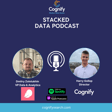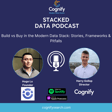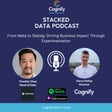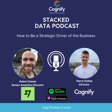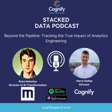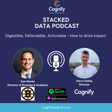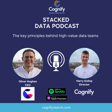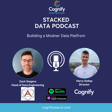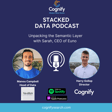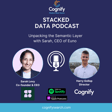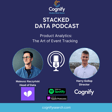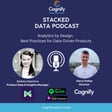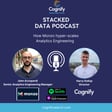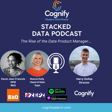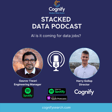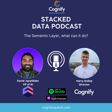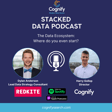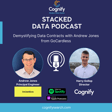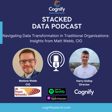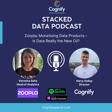Introduction to Stacked Podcast
00:00:02
Speaker
Hello and welcome to the Stacked podcast brought to you by Cognify, the recruitment partner for modern data teams hosted by me, Harry Golop. Stacked with incredible content from the most influential and successful data teams, interviewing industry experts who share their invaluable journeys, groundbreaking projects, and most importantly, their key learnings. So get ready to join us as we uncover the dynamic world of modern data.
Exploring 'Data as a Product' with Mohit
00:00:34
Speaker
Hello, everyone. Welcome to the Stacked Data podcast. This week, we're going to be joined by Mohit, and today we're going to be talking about data as a product. Many companies are transforming their data infrastructure, utilizing the cloud, and adopting modern tooling. For real value creation, you have to go far beyond just tooling.
00:00:56
Speaker
The latest trends we're seeing is a change in mindset and perception to see data as a product. This is what we're going to uncover today with Mohit. Mohit is the director of data platforms at Collinson, leading a huge transformation project himself. Welcome to the show, Mohit. How are you doing?
00:01:14
Speaker
Hello. Hi, Ari. I'm doing well. Thank you so much for inviting me to this, this podcast. I've been looking forward to it and it's great that we are talking about such an engaging topic such as data products today.
Industry Shift in Data Perception
00:01:27
Speaker
Yeah, we were just saying before, haven't we? It's been a huge shift in the industry, and this changing in how we're perceiving data, I think, is so important, and especially in larger organizations where a cultural shift is one of the biggest challenges, I think, that data teams and organizations are struggling with. So yeah, really excited to dive into it.
Mohit's Career Journey
00:01:48
Speaker
But I suppose first off, Mohit, for the audience, it'd be great to share an overview of your career and what your current position at Collinsons is.
00:01:56
Speaker
Thanks for that question. I'm going to start off with the beginning when I really started to understand what do I really want to do in my career. But even before that, a bit about my background as well as the place I belong to. So I'm from India, just to let you know. And I moved to London almost five years back.
00:02:19
Speaker
I came from a very middle class family back in India and lived in a place for almost 13 years where the place used to be surrounded by snow for almost four to five months. So I always have this love towards the hill area. That's why one of the reasons I chose London as a place where I want to grow in my career. From a very simple family. My father is a teacher who is retired now. My mother is an homemaker.
00:02:43
Speaker
But while growing up, I couldn't find a lot of inspiration from my parents, not because they were not good. The reason was because they had a very different interest and idea towards life. But my brother, who I used to call a mathematical wizard at that time, had a big impression on my life. And that's when I realized I'm also good at math.
00:03:05
Speaker
And I started to realize, okay, this is the part which I want to choose. And afterwards, mathematics, which I started to become good at, I pursued my bachelor's in computer science. I moved to cities. I stayed in different cities for almost five to six years. I did my post-graduation in operational research, which was kind of friending at that time. Everyone used to tell me that it is a high-paying job, not the reason I chose it though.
00:03:31
Speaker
Because the reason I chose it is because it was a combination of computer science, statistics and mathematics. And I was finding a good blend of all what I've learned so far.
Transition to Data Science
00:03:43
Speaker
So after the post graduation,
00:03:46
Speaker
I had not really decided which direction do I want to take in my career. So I joined the first company who was able to hire me and then I spent a few years with them. I started to learn a lot about data over there. I started to learn how it is shaping the current world. I used to work with Unilever at that time.
00:04:05
Speaker
and one of the objective i had to understand what's really happening in the market and how we can drive more value through the action created and the action can be created through the data which you receive so i was walking with a big business unit who was mainly concentrating on
00:04:21
Speaker
So beauty is one of the sectors for Unilever. And one of the idea at that time was to understand how the sales are happening and what are the drivers. So I started to build some, my initial forecasting model over there, not machine learning driven, but it was very much basic statistics, which I used over there. And after a while it started becoming a bit mundane. And at that time only we started seeing data science taking a huge swing.
00:04:50
Speaker
outside in the market, everyone is talking about it. So, I was another person who joined that profession. My inclination towards data science was not at that time because I had this mathematics background. I started to gain more interest over data science because I started to realize that a lot of things in the future are going to be driven through data.
00:05:11
Speaker
And if I start to tap into that world now, it is going to be really beneficial for me, not just as part of my career, but my personal growth as well. Yeah. So I think since then I never looked back. I started as a data scientist. I became a lead data scientist and engineering manager in my company after two years because I had a good background of engineering. So they consider me to lead the engineering team as well. Since then I have been leading a team of data scientists and data engineers.
Collinson's Data Mission
00:05:41
Speaker
One of the reasons I did that, because I found the relationship between data scientists and data engineers to be symbiotic in a way, because I mean, they go in parallel and they always need help of each other. More data scientists from data engineers than the other way around. So I thought, okay, what is better than having both the teams under me and then grow it from there. I scaled up my team.
00:06:06
Speaker
I started with two, grew up to 10, then 20, then, you know, promoted to manager, then became a head. And finally, now I'm a director of data platform and machine learning engineering in Collinson. Amazing. I mean, I like what you said, you can't have one without the other, right? You need a platform to be able to form your insights. You need the data to be able to drive that. So yeah, great backstory. So
00:06:29
Speaker
You obviously head up, or director, should I say, at Collinsons for across data platforms and machine learning. What is your actual mission at Collinsons and what's the goal of data? That's a great question. We have spoken about this in the past as well, Harry, and one of the
00:06:48
Speaker
big change which we are going through right now is transforming the way we work with data. Before I start to give you a bit of insight into what's really happening with data in Collinson, I would like to tell you about Collinson as a company. Collinson Group as a company has a prominent presence in the travel
00:07:09
Speaker
They have been in the business for more than 30 years and one of the products which we all take pride in is priority pass which allows different consumers to have a benefit taken by taking a membership and getting access to different lounges across the globe.
00:07:27
Speaker
Now, if you take a look at this product, it is very much consumer-facing and you want to make sure consumers are properly understood, maybe sometimes better than themselves. And when you want to understand them, you want to understand them in such a way where data in a way is dictating their action and you are able to orchestrate the next best action for them so that they are finding it convenient to interact
00:07:56
Speaker
with the product which are providing so that's a good side for me to then talk about the transformation which we have begin to do now.
00:08:06
Speaker
If you truly want to understand your consumer, you want to have the data on your
Building a Data Foundation
00:08:11
Speaker
side. You want to have data in such a way which allows you to go further and understand the consumer in terms of what are they really doing, what are they really trying to have, what services are they liking, and what can we do better for them.
00:08:28
Speaker
Now, for all this to happen in such a way where you are able to make an impact, create a value, you'll have to start somewhere. And that's where your journey of transformation starts. For us, it is very much about creating a better and a strong foundation.
00:08:45
Speaker
We have been working with data for a long time, but as you know, the world is changing outside. A lot of action has happened in last year. People want to move more towards the native AI. They want to understand AI in such a way that it is able to generate value for them.
00:09:01
Speaker
If you don't really have the foundation, you won't be able to really achieve that. And by foundation, I mean not just putting a few pieces together in terms of technology. It is a combination of a lot of things coming together. It's about the people, it's about the process, it's about the technology as well. So the first thing is about creating a better foundation.
00:09:22
Speaker
Now, second thing which we are trying to do, because if you want to truly understand your consumer, then you want to handle data in such a way where you trust it. Instilling the trust in the data is a really long process. And the way we are trying to achieve it as part of Collinson is handling the data quality at the most upstream level. So we are trying, whatever data we capture, it is of utmost quality so that we are able to
00:09:50
Speaker
In real time, take a decision based on that data which has been gathered. As I said, you know, besides that, it's about the people as well. So you want to make sure that all these changes happen in your organization. So the people will have to also come together. People who have been working in a certain way, who are set in their ways. So you need to make them understand why are we doing it? What is the value over there?
00:10:11
Speaker
So one of the aspects of Foundation is to make sure it is as seamless as anything for the end users so that they are able to access the data, see the data, visualize the data, or understand what the data is really telling them. And it is not just for our internal users. Even for the external users, if we are able to create data in the form of a product, what can be better than that?
00:10:39
Speaker
So now all of this is going to lead a path which is going to allow us to think about data as a product. And what's that? I think we are going to talk about that too. But we are very much trying to push the boundaries with the ways in which we have created the foundation so that data as a product is something intrinsic to our strategy.
00:11:08
Speaker
And it is not so much of a problem we are trying to solve, but it is something as an output we are getting from the foundation itself. So these are the things which are happening right now. So just to summarize, what we are trying to do as part of Collinson in terms of building the foundation and putting a structure together which realizes
00:11:31
Speaker
Data as a product is to make sure that we are gearing towards a future where we can start to monetize the data as well. We are able to start seeing data as not just an information, not just a resource, but as an asset as well. So yeah, I mean, there are so many things which are associated
Understanding 'Data as a Product' vs 'Data Product'
00:11:49
Speaker
to that, right? Okay. We need to work with the people. You need to work with the mindset of the people you need to work with.
00:11:54
Speaker
Even if technology is not a blocker, even then you need to make sure that the investment which you are making towards that is able to generate the right return for the business so that it doesn't look like something which you are doing but not being able to generate any value through it.
00:12:14
Speaker
Amazing. I mean, there's so many plates it sounds like that you're spinning, but it's clear this change in mindset as seeing data as a product. It leads to that sort of end goal of either a sufficient ROI on data or actually turning data into a revenue
00:12:31
Speaker
a revenue generator, which I'm sure many businesses and teams would love to do. So that's what we're going to dive into. But I suppose we've been talking about data as a product, Mohit. What actually is meant by the term data as a product?
00:12:50
Speaker
Yeah, I think that's an interesting question. And precursor to that is to first find the difference between data as a product and data product. Because I've seen a lot of discussion happening online, offline, where we start to confirm the definition of data as a product and data product. And it is not for the wrong reason. It is for the right reason. But it's still
00:13:13
Speaker
we'll have to make sure what our goal is when we talk about data as a product and what our goal is when we talk about data products. So I'll try to maybe pull out some real life examples. So I was thinking about this in the morning today and as I was opening the news,
00:13:32
Speaker
So news is a source of information for everyone around the globe. And the way you access it and the way you used to access it before, there was no internet. It used to be physical copy of the news, which you can really get access to. And post the internet, obviously they started to have this influx of all these different websites and the application. So now you can easily access it in palm of your hand.
00:13:58
Speaker
But now for a second, if you almost separate news from this physical copy like a newspaper or online information, then you are just left with news. So the question would be, can you treat news as a product?
00:14:13
Speaker
So to do that, you'll have to understand what the product is. So product in very simple terms is tangible or intangible item, which is able to provide some value to the consumer, right? Now, when you try to overlay this definition on top of your physical copy of the news and an online way of accessing the news, you almost think, yes,
00:14:36
Speaker
You know, physical copy, tangible item, yes, it's a product, online information, intangible, but it's still giving some sort of service to consumer, that's a product, right? So we already have news products which are offline and online. But again, if you go back, can you call news a product? And so news in itself,
00:14:56
Speaker
Unless or until it goes through a process of cleaning, meticulously crafting it so that it is finally curated and composed in such a way where it is making sense, it is resonating with the audience, it is relating to the audience, it cannot be called a product. So what we are doing is before news becomes a product as a newspaper or any online medium, we are going through a process of packaging it better.
00:15:25
Speaker
So if you then try to draw parallels with data, now that's why I was mentioning data product before, right? Because you want to build data products at the very end because which is basically the by-product of data as a product.
00:15:40
Speaker
Now, you want to build dashboards, which are going to be seen by your executives. You want to build a recommendation engine, which is going to be used to power notification and interact with the audience and consumer in a better way. But the precursor to that is data. And
00:15:57
Speaker
If we are not going to be treating data as a product, if you are not going to be able to package it better, are we going to be able to achieve something which we want to achieve as a data product? I don't think so. So that's why data as a product should be given the priority in terms of being able to package it properly. So what do I mean really by packaging it better? So in the organization,
00:16:23
Speaker
A lot of organizations which are active for the last many years, they have data residing in different parts of the business for a really long time. You must have seen and heard that Silo's update has been created. Every user or every business area has a different way of interacting with the information, interacting with the data.
00:16:44
Speaker
When you see that happening, then there are chances that everyone has a different interpretation of the data. Everyone has a different way to work with that data. Data can be anything, right? It can be sales, it can be finance data, but if it starts to pop in different places, two different people, the interpretation of that
00:17:06
Speaker
if not taken carefully can be detrimental because you're talking about some information which is going to be used to take some action so packaging the data better is required so that you are able to discover the data better which is basically creating
00:17:23
Speaker
some form of mechanism inside the organization wherein you are able to understand the data or you are able to understand something about the data without really putting a lot of effort. Second is addressable. So your data needs to be addressable. Basically it is
00:17:40
Speaker
The moment you see the data, you have the associated information around it. You know what data or metadata belongs to that. You know what each field is talking about. And you know if you are able to draw the insights out of this data, it is going to be reliable. The last one is the way the data is accessed right now.
00:18:03
Speaker
When you want to create data as a product, you want to make sure that data is not just available with one medium. There can be multiple mediums to access the data. You can start to make data available through an API. You can start to make the data available through a dashboard. All of this is happening in such a way where it is underpinned by trust.
00:18:32
Speaker
So when you start to package data in such a way where it is discoverable, it is addressable, it has different types of access and underpinned by trust, that's when you start to realize that, okay, now we have a way in which we can proceed further. We can start to think about the value which we can create through the data. Now, I think somewhere
00:18:54
Speaker
We need to also ask the question, why are we even calling it a product then? Why do we really need to have a product thinking around it then? Because if we are able to do it, this is just one time job. I think we need to change somewhere the mindset around it because product thinking is about being able to do multiple iterations and being able to treat something in such a way where
00:19:16
Speaker
there is no definitive end.
Adopting a Product Mindset in Data Teams
00:19:19
Speaker
So you start with something basic, you start to create something which is made available to the consumer, but you keep thinking about the improvements. You keep thinking about how it is going to be creating value in itself. You keep thinking about how do we start to make it available in such a way where people do not really need to wait, do not really need to
00:19:39
Speaker
waste a lot of time. You also think about how this data as a product, if it is sales or finance, is not replicated because you are talking to every part of the businesses. You are taking in the input from them. You are putting that as part of a roadmap. You are going through the iteration where you are incorporating all those changes as part of your data as a product. So this is what the basic definition is. There are many other examples as well, which I can give.
00:20:05
Speaker
I think very simply would be, if someone is going to a supermarket store, they would see oats, the big packet of oats. When you just start to use oats in your daily life, the original oats, which you can mix with any kind of milk, and when you start to eat it, that as a raw product in itself,
00:20:25
Speaker
is a product, right? And you can then call oats as a product, but then they started to come up with different variations, which is dark chocolate oats, blueberry oats, golden syrup oats, and then they started to sell them in a specific package, which is like one simple box where you just throw hot water and then it is going to give you the same taste, same flavor, what you were
00:20:46
Speaker
getting before. So what they did, you know, they have treated Oats as a product and created by-product out of it, which are generating value in itself. So this is what I would define data as a product.
00:21:02
Speaker
I love that. I mean, the analogies that you shared within the real world are really easy to relate to. And so data products or data as a product is a creation of a data product. And it's that constant iteration, constant improvement, constant feedback loops, which enables your data products to continue to progress, to add more value, which is the exact approach that you take with any other.
00:21:29
Speaker
with any other product that you have. So it's a really interesting mindset shift, isn't it, as to how we treat data. But it's not just something I think that the data team needs to do. It's also how the data team is then perceived by the organization. So how does this data as a product and this mindset shift to this continuous feedback actually then lead to value creation?
00:21:55
Speaker
Yeah, I think that's a great question in itself because why are we even doing it if there is no value, right? And we are asking about people to change their mindset. We are asking people to come together. We are asking people to collaborate. So there should be some outcome delivered through that. I think a very simple example would be, you know, go back five years or even now in some organization, the approaches which we have around data, it is quite antiquated.
00:22:23
Speaker
Because if you take a look at the way we handle the data or the way we are driving value through data in most of the organization, it is through reporting, dashboarding, right? And all those requests for reports or dashboards are mainly driven by a demand
00:22:43
Speaker
in the business area. And a business area, be it commercial, be it finance, be it partnership, anyone would come to the data team and they would ask, okay, I want this dashboard and I want this report to be created and data team is building that. And now
00:23:03
Speaker
A demand created by a partnership team sometimes can be similar to a demand created by a commercial team, but do they know about that? Do we have a way in which we are able to communicate with both the teams that, you know, this is the demand created by you, we already have something? I don't think so because we do not really, most of the organization
00:23:23
Speaker
when they are working with the data, it starts to happen. Not that they want it, but it starts to happen in such a way where you start to treat the demand separately and start to create silos through the data. And we spoke about it why silos are not really good because it is going to
00:23:41
Speaker
create a room for misinterpretation. And even if not misinterpretation, let's say, the same data is being used in one dashboard for finance, one dashboard for commercial, but the numbers look a bit different. Which one would you trust? And that's when you start to open a can of warm, which is going to then take a few months, two years just to solve it. Now, if you think about the impact or the disorders,
00:24:10
Speaker
wastage of resources as well as, as the time is happening for this process to be completed. It's you, you are, you are having a data team working on all these ads, what you have commercial team, making sure that their demand is properly understood. You have financial team. They are also trying to get something out, but then there is confusion because we don't know this data to trust. We don't know his data. So do we go forward with, so then you start to realize, okay, why is this happening? Because there is no framework.
00:24:39
Speaker
Because there is no framework which you are utilizing to work with the data, work with the data in such a way where we are being iterative about realizing the value. And that nature of being iterative is what data as a product is.
Frameworks for Data Ownership and Alignment
00:24:56
Speaker
Now, let's imagine a future wherein you started to explore your organization. You have a framework that you want to define all kinds of data assets you can find throughout the organization. So you will have to create a broad approach wherein you start to define financial data assets. You start to define sales data assets. You start to define consumer data assets.
00:25:21
Speaker
If you start to define these data assets, you start to understand where this data is coming from. And then you start to also align different data owners to it. You start to have this framework where every data is not going to be the responsibility of a data team, but of a business user who has the authority to make a decision on top of it.
00:25:43
Speaker
If you assign all the data owners, first of all, as part of this framework, you are making sure there is an ownership given to it. Now, it starts the process where you start to build these data assets in such a way where you have product thinking imbibed into it.
00:26:01
Speaker
Take an example of sales data. If you have sales data, you know from which source this is coming. You know who the data owner is. You have also laid out the consumer of that data. Now, these consumers are going to be giving you the demands, and then you can start creating a backlog of that demand. That's going to become your product roadmap for the sales data assets. Now, if you are able to achieve it properly, first of all, there is not going to be any silos of data. You are basically
00:26:29
Speaker
involves confusion, which is going to be rising in the future. Your team is properly able to understand who to reach out to if they want to know more about the data because there's a data owner. And then because you are doing it by
00:26:45
Speaker
by using a product framework or data product framework, then you do know anything which you create out of it is intrinsically clean and trustworthy. So now let's say that the sales data has a value, not just internally, externally as well, to have it used as part of the data marketplace, have it sold to your partition client, then you can start to build a monetization framework around it.
00:27:10
Speaker
So this is one of those examples where you can truly start to see the value created by just doing things in such a way where it is following a framework.
00:27:21
Speaker
Amazing. I mean, what you mentioned there about building out a framework and having owners of the data, obviously, them owners tend to be probably your stakeholders and the people that are within that domain. So they are best suited to have that context, the business, the challenges, and the pain points, and really what they're wanting to achieve with that. And that is obviously a crucial part of being able to then translate that data into something that's usable and actionable.
00:27:50
Speaker
We've obviously been talking about data as a product and I suppose the philosophies and why it creates value, but you've already mentioned about this data product framework. Would you be able to elaborate for the audience and give some examples of how you guys are implementing a data product framework and what other organizations and our listeners could take away and look to apply in their own organizations?
Aligning Data with Business Strategy
00:28:15
Speaker
Yeah, for sure. All of the framework inside any organization start with the understanding of business strategy. I was having this conversation with one of my lead data scientists the other day, which happened to realize that we need to have everything which we do aligned to business strategy. And it was really nice to see that team has started to realize, you know, why do we always talk about the alignment between business strategy and anything which we are doing?
00:28:44
Speaker
Now, if you have understood it, or if you have understood it in such a way where you know what organization is aiming towards, then what becomes possible for you is to know the framework which you want to test out. I'm not saying all the frameworks from the get-go is going to be perfect, because you will have to go through a process where you improve it. It can't happen. Like you do with the data products, that constant iteration.
00:29:10
Speaker
Yeah, I think but the frame in itself is quite essential because you are using that frame to communicate, you are using that frame to create a mechanism in which people can collaborate as well. So basically what I do or what we are doing within our organization because I said we are going through a transformation wherein
00:29:32
Speaker
We want to become product-led. We have a strategy to become product-led. We have a lot of initiatives wherein we want to understand data in such a way that it can be incorporated as part of a product in a very seamless way. Now, for us to define a framework, first of all, we'll have to define different parts of the business who we want this information to reach to or who we want this framework to reach to. So, I would almost
00:29:59
Speaker
draw a concentric circle. And the innermost circle would have the business strategy, which is aligned to the change which is being suggested as part of your transformation. I think that inner circle basically represents and defines what that business strategy and what that team looks like for you, for your function, and for your organization. When we go a bit outer in the outer circle,
00:30:29
Speaker
that would be the team who is using that information to form a data product framework. So that's the data team. Then you start to go another one circle out again. So that would be the product team, then one circle out again, business team. So basically you're creating these circles so that you have every understanding in your head that these are the teams you are going to be interacting with. Now it starts
00:30:52
Speaker
the line of questioning which you need to ask yourself and then allow those questions to be put as part of the framework. I think a very simple example and a very good example would be what I was talking about earlier as well. One of the reasons we have started to find data owners as part of our organization is basically to have
00:31:11
Speaker
a bit of accountability and ownership created within the organization and because if you don't have that and then when something goes down or something goes wrong you don't really have anyone to reach out to because right now it's all data teams. Everyone's pointing at each other.
00:31:28
Speaker
Yeah. So there is, yeah, I mean, there's a, there's an image, right? Okay. Where one person is standing to the other person. It's like spider, three spider-man. You're just pointing at each other. So it's that kind of situation, you know, where, which you find yourself in.
00:31:43
Speaker
So what is really important to note over here, why do we try to really have all the alignment of different data domains? Now we call it data domains because these are the domains which you work with the business and every data domain has an owner because you want that ownership to be there, you want someone who has the accountability but also the authority to orchestrate and make a decision. So
00:32:07
Speaker
Having that, first of all, already gives you a very overarching view of what data assets do you have in the organization, and how are you able to define the ownership of it. Now, once you have that, then you start to realize that, okay, so that framework is there, that ownership matrix is there. The next step is what to do with that.
00:32:28
Speaker
because all these data owners are the senior leaders in the organization who do not always have the time to take a look into the issues with the data. So you start to assign different delegates inside that data owner symmetrics as well, which can be called anyone like data stewards who are going to have daily responsibility to look at things
00:32:51
Speaker
in such a way or look at the data in such a way where they can really start to identify and talk about the issues which are bothering them or which are bothering the business so that we can start to make better decisions. Now, the metric is one thing.
00:33:06
Speaker
But then how do you start to really take it further to build data as a product? Because building is another thing which you are going to do, right? So then once you have the domains, you have the data domain owners, so you need to have a vision that, and this is the vision which we have at least as part of our organization, that every domain which we have, we want to make
00:33:29
Speaker
Sure. These domains, the data in these domains are accessible to all the business user, consumer, and data owners in such a way where they don't find there'd be any friction. So how do you do that? Okay. So that's why I was talking about foundation at the beginning because foundation doesn't really mean just creating a place where you can dump all the data. It is also about putting a framework together where every data domain is independent by itself and has the ability to provide the value by itself.
00:33:59
Speaker
When you start to look at all of this that way, then you start to realize if you have all these owners, then you have also data domain built, then now you can start to work on a process which is very much then business-led, which is the consumer.
Challenges of Trust and Cultural Change in Data
00:34:16
Speaker
Let's say you created a consumer data domain and you have assigned the ownership of consumer data domain to a consumer data owner.
00:34:24
Speaker
and there are already going to be some demands, some requests from that team itself, but a finance team reaches out to the data team who is to do something with the consumer data. You already have the owner, you already have something already built, so you can start to put that as part of the backlog. The finance team do not start doing something by themselves with the consumer data. So basically you are breaking the silos, you are breaking that barrier which used to be there, and then you are allowing all that independence
00:34:53
Speaker
ways in which some of the decisions, some of the work can be done. Now you are going to be facing a lot of challenges because the perception in itself takes so much of space in the organization. It doesn't really allow you to go further because now data in most of the organization is seen as a resource, not as an asset.
00:35:14
Speaker
because it is a resource which is basically giving you some form of information which you want to convert into ex-enabled insights. But are we treating that as an asset? That's a question, right? So you need to then start having these conversations with a different part of the business. Why are we even doing it? Then you start to then align this strategy with the people within the organization. People are the
00:35:38
Speaker
the heart in making these things happen because if they are set in their ways, it is very easy to say that, okay, you're going to have a data owner. What if the data owner doesn't agree to become a data owner, right? So because that's an additional responsibility, which you are going to be given to them. And not everyone is comfortable with that.
00:35:58
Speaker
So how do you do that? You start to educate, you start to have this training done, you start to tell them it is not an additional offer, you know, responsibility, but it is something which as part of the same job they can do to improve the way they are able to take the decision because this in the end will allow them to take the better decisions.
00:36:21
Speaker
Then I think, because I've been talking about data domains, as part of our organization, we have already started to test some of these things out. We started with some one dataset, which is a traffic dataset, which allows us to understand everything happening across different lounges in the market. This traffic data is being utilized by various people in the organization. Finance wants it because they want to forecast the budget.
00:36:46
Speaker
commercial wants it because they want to understand the performance in the market, other people wants to know, the operation wants to know about it because obviously they want to know what's really happening in the market. So now you already have a multifaceted use case. And then you start to, once you start to collect all these requirements, in itself it is a loaded requirement.
00:37:08
Speaker
And then what you start to do is you start to engage with these different people and say that this is the same requirement, why we don't need to do it multiple times. Now what we need to do is create a strategy, follow a framework, create data as a product, data being traffic and have this iterative nature wherein we are going to be improving it day by day based on the inputs provided by you. So this is how I would say
00:37:34
Speaker
we can start to experiment. And again, one point to mention, any product development starts with experimentation. And experimentation is what allows you to understand whether it's a success or a failure.
00:37:48
Speaker
A failure gives you a different path, which you can take. A success is obviously going to tell you that you are doing the things right, so keep doing it. But you need to have the mindset to experiment. There is going to be a lot of apprehension in the organization, wherein experimentation in itself is not welcome. So again, it is about the people where you start to show them why are we doing it, and then go on to do these experiments, even the framework
00:38:18
Speaker
is an experiment in itself which allows you to create a data product. Amazing. That's a really clear framework that you've outlined to how people can start to implement something that can then be actionable. I think it sounds like a lot of work from the get-go, but as you said, this can stop
00:38:35
Speaker
you duplicating your work and can give you a much clearer idea of prioritization by the sounds of it as well when you have these products set up. And once things are firing on the right cylinders, you can then really be able to see where improvements are needed and which ones are more important. So that's great to hear. Mohit, you mentioned some of the challenges
00:39:01
Speaker
around this approach, communication, changing mindset, product owners, not wanting data owners, not wanting to become data owners. What are some of the other biggest challenges in this space and how do you look to overcome them?
00:39:15
Speaker
Yeah, I think there are many challenges, right? And I have my own share of challenges while trying to incorporate some of these things as part of current organization. And we have spoken about the people, we have spoken about the ownership. Now, there are two more. One is the culture.
00:39:33
Speaker
When I say people are set in their ways because they are following a culture, a culture which almost speaks about the way things have gotten done and the way things have been as part of the organization.
00:39:47
Speaker
And it also starts to tell you why people are doing things the way they are doing. But I think that's a good starting point. The challenge is, first of all, a lot of times we don't even know why people behave the way they behave. So we start to get frustrated when our ideas are not being accepted.
00:40:09
Speaker
But the moment you start to realize why people are being resistive or why people are very averse to change, then you start to think about, what would I do if I were them? And then you start to think very logically, maybe I would do the same thing as they are doing because first of all, they don't
00:40:31
Speaker
think it is going to be as beneficial as we are seeing it. So what we need to do, tell them a different story, give them a story which allows them to see not just what can happen right now, what will happen in next 3 to 5 years or 2 to 3 years. And this culture is very much associated to the other challenge, which is short term thinking. I guess we are
00:40:56
Speaker
We are good the way we work. We are getting our data. We have a Tableau dashboard, which we can look at every morning or get the data is flowing in over there. Anytime it breaks, we have a data engineer to call. And yeah, it's going to happen. So what's the point of doing all of this? And it is not because they don't want to think about the future, in my view. It is because they are not able to think about the future in the way we are thinking.
00:41:24
Speaker
And that's where you start to then come up with these different methodologies where you start to ask them to be part of some trainings and tell them, okay, this is why we are doing it. A very simple example would be, so one of the data products which we are trying to build as part of our organization is called, it is something related to forecasting, but it allows us to understand traffic in different sectors of the market.
00:41:50
Speaker
And it is data driven. It is incorporating a lot of external data with it. And, and it is able to tell different partners that, okay, this is when you can find the market getting busier. So it is form of an API, which can be easily incorporated. But now, you know, although we have already invested a lot of time in it, and there is, there's a lot of improvement which has happened even, even to incorporate that.
00:42:15
Speaker
within a product has become really challenging. First of all, because product roadmap itself has a lot of items already, which is not able to consider it. Second is almost about they are not able to see the value. And to be honest, in short term, there is not a lot of value in it. But in the long term, when you start to think about the behavior, the data, which you're going to be collecting through this,
00:42:38
Speaker
it does an immense value which can allow you to further grow your offering further grow it in such a way where consumers are properly understood now.
00:42:49
Speaker
Is it because they don't want that to happen? I don't think so. It is because, first of all, they have their own priorities. And second, they have their own roadmap. And third, they are not able to really see what we are seeing. So in some ways, we need to find the right balance in which we are able to show them what can happen now and what would happen in the future. At the same time, give them the assurance that it is not breaking
00:43:15
Speaker
the pattern which they follow. It's not breaking the routine which they follow because sometimes they are quite risk averse as well. Or you will find a lot of people who are in the organization risk averse as well. So you need to tell them, okay, we'll have to do this because we want to gear ourselves up for the future. There are other ways as well, which you can do. I think sometimes
00:43:39
Speaker
Sometimes, you know, I think maybe doing a workshop, okay, where you are able to tell, you know, give them some sort of immersive experience. Okay. Where in creating a story, which allows them to see what you are seeing again, it is, it is difficult because not always
00:43:55
Speaker
every data product which you want to build or any product which you want to build would have that capability. So, you know, I think cases to cases, it changes. But yeah, I think culture and then saw them thinking are the challenges besides people and ownership. Although all of these are interconnected in one way or the other.
00:44:13
Speaker
they're like a spider web of challenges really aren't they and you know i think it comes down to to us as data professionals you know we we're immersed within the industry passionate about where it's going to go and how we can improve our own industry but then you know you take yourself and speak to someone that's not doesn't understand the data industry there
00:44:34
Speaker
how on earth are they meant to understand what's possible? So I liked how you obviously spoke about workshops and about sort of making them sort of see how this could impact their role in a positive way and that slowly change in mind shift. And I think you need more than just a leader helping you with that. You need your whole team and to get them champions also throughout the
00:44:58
Speaker
Yeah, I think there are three things which I normally follow, which we need to do as part of the organization for us to be able to have some success registered. The first one is make it visible, which is very much about what you are doing. Is it being made visible to everyone in the organization? It's just not about data being made visible, but the effort should be made visible as well. So find a way, find a medium which is
00:45:23
Speaker
always convenient for everyone in the organization to access. So that's the way you are going to be able to speak about the progress. Another one is over communication. I'm not talking about communication. I'm talking about over communication because that's better in these cases than
00:45:40
Speaker
than anything else because you want to be able to have a way in which sometime the communication has become so disturbing that people have started to take interest to know more about what you are really up to. So channels like if you are using slags or if you are using some internal website, if you try to post and try to talk about all these things, if you try to gain more and more attention from these people. Last one is about facilitation.
00:46:08
Speaker
If you have a data governance team, if you have a team who is basically working on all these frameworks, these frameworks are not going to come to life by itself. Someone will have to facilitate it. Someone will have to organize the call. All the data owners are collecting together and then being able to understand why are we doing what we are doing and then able to maybe discuss that among themselves. Facilitation is something which we need to do because
00:46:36
Speaker
I think somewhere I also feel that the data team will have to teach themselves about the art of data as a product before they teach anyone else because the journey starts from within. I feel a leader deciding that now it should be data as a product is not going to make it work. You'll have to take every person in your team into this journey.
00:47:03
Speaker
and which is going to enable you to go further and then reach out to the rest of the organization. Amazing. There are some really actionable points there for the audience. And I think we've gone really into depth, I suppose, into what seeing data as a product can do, some of the challenges and some of the value that it can really impact.
Collinson's Data Journey and Overcoming Challenges
00:47:26
Speaker
And it sounds like it's
00:47:28
Speaker
a long journey and something that you guys are doing successfully at Collington. So really appreciate you sharing all of that information. We're going to be jumping to the final section now, Mo here. It's just a quick fire round, which we ask all of our guests. It's really to help the audience with progression in their own careers.
Evaluating Job Opportunities in Data
00:47:47
Speaker
So first question, how do you assess a job opportunity and how do you know if it's the right move for you?
00:47:54
Speaker
That's a loaded question because I think it depends person to person, right? But I would give you my take on it. There are different routes anyone can take when they want to make a career change or, you know, do a switch of some sort in their career. So I start almost with nothing. Self-awareness is something which I always talk about. You need to first of all have the self-awareness, which is not so much about annoying
00:48:23
Speaker
everything about yourself. But if that is something which can happen, that's going to be amazing. But self-awareness to at least have a little bit of clarity as to where you are in your career journey. What do you think you really want?
00:48:39
Speaker
And are you really satisfied with the level of work which you are doing right now? And as well as asking yourself questions like, what are your true strengths? Because I am the guy who tries to play with the strengths of the people and try to encourage them to do something which they are always doing better. When you have this sort of introspection into self-awareness, then you start to
00:49:04
Speaker
understand what works for you, what doesn't work for you, because that's a baseline. Self-self-awareness is a baseline, and then you can start to aim towards the improvement which you want to do for yourself. I have some examples. In my career as a leader, I've seen a lot of people who have asked the same question to me in terms of, what should I do?
00:49:29
Speaker
There have been cases where one person left the company, left my team, joined one of the farm companies. Just after three months, I got a call. They are not really happy because the kind of work they are doing isn't what was happening with the team I had over here. And they want to come back, but unfortunately, I couldn't really make that happen. But then the realization they had was
00:49:56
Speaker
About what do they do to you on because one one of the ways you can understand what do you really want by?
00:50:01
Speaker
going to something which is totally not working for you. And that thing, because it was not working for him, and then they had to just make that change. I'd say that's a nice positive spin. You can take these negative experiences to know and to truly understand what you really want to go to. Second question, Mohit. What is the best advice for people in an interview?
00:50:32
Speaker
Yeah, this is what I follow. I've heard a lot of people saying, be yourself. I'm not going to say that. I'm going to say be authentic, just not yourself. I think authenticity has a close relation to your body and mind.
00:50:47
Speaker
The moment you are authentic, you start to see that having positive impact on your thoughts and the level of clarity which you get by doing so helps you a lot while you are preparing for an interview or
00:51:03
Speaker
or about to give an interview. I think I have a very good example and it's not an example, you know, I would always give, but I was taking an interview off for one of the position and I came across one person who had applied and first round that person cleared and in the second round when after the interaction, very bluntly, the person told me that they don't want to walk with me.
00:51:30
Speaker
And I was taken aback by that response because I am the interviewer and I need to find out whether they are eligible for that rule or not. And I was leaning more towards a yes than a no, but then that was kind of shocking. And the conversation ended, but then I started reflecting on myself.
00:51:50
Speaker
I think being authentic also comes with the responsibility to be able to say no to something which you truly don't want. And for a kudos to that person who was able to show that kind of careers during an interview, all the knots are good for me. But I think that's what you need to do. And I hope they are doing better in the career. They have gotten what they wanted. But at the same time, authenticity really helps you to clearly see the direction you want to take.
00:52:20
Speaker
So yeah, I think apart from all the skill sets that you need to have and all the upscaling, which you need to do, all the talent, which you need to possess, authenticity is going to really take you further. Yeah. That's a really, really interesting story.
00:52:35
Speaker
People I think sometimes get caught up in the fact that they interview for interviews sake and sometimes forget the real goal of how much this is going to affect their lives when you've got five, six interviews on the go. So being yourself and truly knowing what's going to make you happy and what's going to help you progress is great advice. And finally, Monet, if you could recommend one resource to the audience to help them up skill, what would that be?
Learning Resources and Episode Conclusion
00:53:04
Speaker
Yeah, I think I was thinking about what would I recommend and I think there are many mediums and nowadays people are just typing the question in chat GPT and then getting the answer. And I think I would say I don't really have one resource and because I myself go across different channels, you know, I'm very much about reading the blog post and then
00:53:27
Speaker
listening to podcast and then you're trying to learn more, not just about the data, but you know, I think the.
00:53:35
Speaker
the way, you know, things are really happening in this world. A lot of impact has been created on my life by listening to certain podcasts such as the Modern Wisdom and the idea of a CEO. I think listening to mainly those podcasts where the invitation or the guest was a CEO, you know, one I remember, one time Monjo's CEO had appeared. I think it was a really interesting conversation, which I still reverberate, you know, in my brain.
00:54:04
Speaker
But yeah, I think I'm not much of a reader. I do try to read. I have a few books, which I, one books, which I had funded earlier as well. If you really want to know about the product, you need to read this book called jobs to be done because it allows you to get more closer to consumer and understand their mindset and allows you to know why do you
00:54:26
Speaker
What do you do for the consumer when it is about developing a product? Because jobs to be done is all about the job you want to get done for the consumer. But this is what my recommendation would be. If I do get a chance to have more insight into the subject, I'll let you know how it exists.
00:54:44
Speaker
I think that's great. I mean, you shouldn't put all your eggs in one basket right there. There's so many different opinions, different approaches, even within one subject area. So I think to be truly immersed, truly understand using different mediums, different sources of information, help you then be able to then formulate your own opinions on a topic.
00:55:06
Speaker
It's been great. Well, that's it, Mohit. Brings us to the end of the show. It's been a real pleasure to talk about how you guys have been seeing data as a product and how I think the whole industry is starting to shift. This has been going to be the first in an upcoming series of episodes where we're really going to be focusing on this topic for different areas. Thank you for setting the scene. Your insights have been incredible.
00:55:32
Speaker
Thank you so much, Eric, for inviting me. And it was a pleasure to be part of this podcast. And hopefully the series, which I've started on data product is going to be incredible and I'm going to tune in myself. Brilliant. Brilliant. Well, Mo here, any of the audience, I'm sure if you've got any questions, Mo here would not mind. Yeah. Connection request and speaking as well. But yeah, for now, thank you, Mo here and goodbye. Thank you so much, Eric. Goodbye.
00:56:00
Speaker
Well, that's it for this week. Thank you so, so much for tuning in. I really hope you've learned something. I know I have. The Stack podcast aims to share real journeys and lessons that empower you and the entire community. Together, we aim to unlock new perspectives and overcome challenges in the ever evolving landscape of modern data.
00:56:21
Speaker
Today's episode was brought to you by Cognify, the recruitment partner for modern data teams. If you've enjoyed today's episode, hit that follow button to stay updated with our latest releases. More importantly, if you believe this episode could benefit someone you know, please share it with them. We're always on the lookout for new guests who have inspiring stories and valuable lessons to share with our community.
00:56:43
Speaker
If you or someone you know fits that pill, please don't hesitate to reach out. I've been Harry Gollop from Cognify, your host and guide on this data-driven journey. Until next time, over and out.

